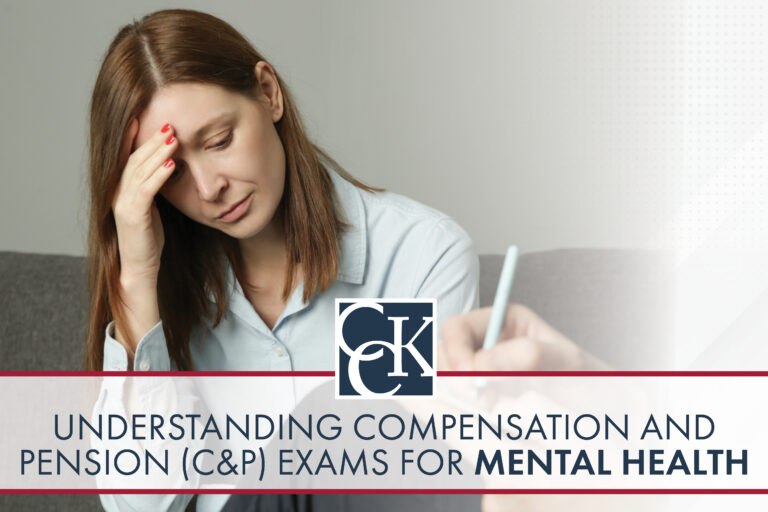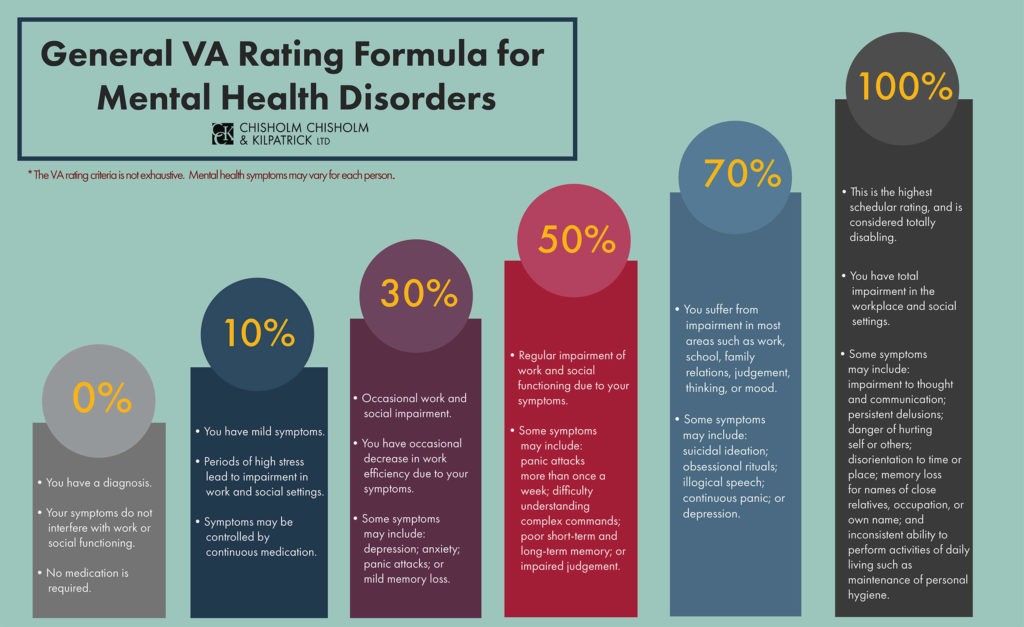Understanding Compensation and Pension (C&P) Exams for Mental Health

CCK Law: Our Vital Role in Veterans Law
After a veteran files a VA disability claim for a mental health condition, VA may order a Compensation and Pension (C&P) examination. A C&P exam for mental health allows a medical professional to deliver an opinion about whether the condition is connected to the veteran’s military service or how severe the condition is.
This article will provide CCK insights into the VA mental health C&P exam, likely questions and criteria, and appeal options for VA behavioral health claims like PTSD, anxiety, and depression.

What Are C&P Exams?
Compensation and Pension, or C&P, exams are medical exams ordered by VA to evaluate the conditions that a veteran is claiming for disability compensation.
These exams are meant to assess the cause and severity of a veteran’s condition and are part of VA’s duty to assist veterans in obtaining evidence to support their disability claims.
Do All Mental Health Claims Require a C&P Exam?
VA does not always request C&P exams for mental health claims. As you prepare for your mental health C&P exam, it can be useful to keep in mind why VA requested a C&P exam in your case. For example:
- Service connection: VA may schedule a mental health C&P exam to determine the etiology (cause of the mental health condition) to help establish service connection.
- Severity: VA may request a C&P exam for behavioral health to establish the severity of your condition and thus what rating to assign to your mental health disability.
Who Conducts a Mental Health C&P Exam?
VA behavioral health exams may be conducted by a VA examiner or by a VA-contracted third-party medical professional. The veteran cannot pick the examiner.
Prior to the exam, the examiner will review the veteran’s C-file so they have some familiarity with the veteran’s claim. However, the examiner will likely not be as fully informed as the veteran’s own physicians or mental health professionals. The veteran should be prepared to explain their mental health condition in detail again.
How Important Are VA Mental Health C&P Exams for Claims?
VA C&P exams for mental health are highly significant in the VA claims process. VA will often give more weight to the opinion of the C&P examiner than that of the veteran’s treating doctor.
What to Expect at a C&P Exam for Mental Health
The C&P exam for mental health has a number of similarities to regular C&P exams.
What Are the Mental Health C&P Exam Questions?
The medical examiner will typically ask the veteran questions about how their mental health affects them daily. The questions the examiner asks will vary based on the veteran’s claim (service connection vs. increased rating).
The examiner or a treating physician may also complete a Disability Benefits Questionnaire (DBQ). The form allows the user to use checkboxes and standardized language to evaluate the veteran’s disability quickly and correctly. Specifically, healthcare providers will “check a box” next to a description that most accurately depicts the disability in question.
The DBQ also addresses the veteran’s level of social and occupational impairment. For example, the level of impairment due to depression ranges from no diagnosis to total occupational and social impairment, with various levels in between. Assuming a veteran meets all the criteria from the DSM-5 necessary for a diagnosis of their specific condition, the symptoms section of the DBQ will then help determine the appropriate disability rating.
In some instances, the examiner may physically examine the veteran. With behavioral health conditions, a physical examination may occur if the veteran’s mental health condition is linked to another condition. For example, if the veteran suffers from debilitating back pain which has caused them to experience depression, they may file a claim for depression secondary to back pain. At the C&P exam, the examiner could physically examine the veteran’s back and ask questions regarding the connection between the back condition and the veteran’s depression.
Veterans must be honest and upfront with the C&P examiner about their symptoms and the way the condition impacts their lives.
What Symptoms are Mental Health C&P Examiners Looking For?
VA uses criteria from the Diagnostic and Statistical Manual of Mental Disorders, Fifth Edition (DSM-5) to evaluate whether there is a valid diagnosis of a mental health condition during the C&P exam.
Common conditions that a mental health C&P exam may consider include:
- Anxiety disorders (e.g., panic disorder)
- Trauma and stress-related disorders (e.g., post-traumatic stress disorder)
- Psychotic disorders (e.g., schizophrenia)
- Cognitive disorders (e.g., dementia)
- Eating disorders (e.g., anorexia or bulimia)
- Mood disorders (e.g., major depressive disorder)
- Residual effects of traumatic brain injuries (TBI)
Tips for Mental Health C&P Exams
- Attend your exam! Failure to do so without providing good cause can result in VA denying your claim without looking into further evidence.
- Be aware that you can bring somebody with you to the exam if you feel they can offer additional information or if you do not feel comfortable attending alone.
- VA examiners are likely to observe you from your arrival at the office. This means that from the moment you walk into the waiting room, examiners may monitor your interactions with other patients and the staff.
- Answer the mental health C&P questions as honestly as possible. Do not under- or over-report your symptomology. Instead, make sure to carefully explain to VA what you are experiencing on a daily basis and how your condition affects your ability to function both at work and at home.
How Does VA Rate Mental Health Conditions?
VA adjudicators will use the veteran’s C-file with the results of the mental health C&P exam to assign a numerical rating that will be used as the basis for the veteran’s monthly compensation and other disability benefits.
Except for eating disorders, VA rates all mental health conditions using the same diagnostic criteria. Specifically, VA rates mental health conditions under 38 CFR § 4.130.
Ratings range from 0, 10, 30, 50, 70, and 100% based on:
- The level of social and occupational impairment, and
- The frequency, duration, and severity of the symptoms listed in the criteria.
However, the symptoms listed are not exhaustive. They are meant to serve as a guide for the level of impairment at each rating.

Do I Need to Meet All Criteria in VA’s Mental Health Rating Formula?
No, veterans do not need to exhibit every single symptom listed in the rating criteria. Since mental health conditions can manifest differently per individual, VA’s rating formula for mental health conditions is simply a set of guidelines.
Symptoms listed in each level of the rating formula are simply examples meant to demonstrate the types and levels of impairment commonly found at that assigned percentage rating.
For example, a veteran may be so anxious that they pick at their skin, causing physical harm to themselves. In this case, skin picking can be considered as both self-injurious behavior and an obsessive ritual that interferes with routine functioning, thereby warranting a 70 percent disability rating. It should be noted that even though skin picking is not a symptom that is listed in the rating criteria, it is similar to other symptoms that are listed.
What If I Have Multiple Mental Health Conditions?
It is not uncommon for a C&P exam for a mental health claim to identify a different or even multiple mental health disorders. Psychiatric disorders can sometimes be difficult to tell apart as many disorders have overlapping symptoms. Similarly, many mental health conditions are connected.
For example, it is common for veterans to develop depression or anxiety as a result of their PTSD. However, VA does not rate each condition separately under its General Rating Formula. Instead, veterans with multiple mental health conditions will likely be assigned one combined rating.
VA exams will typically address this directly, as the DBQ form requires the veteran to specify if they have more than one mental health condition.
Veterans can only be rated for a symptom’s functional limitations once.
An example would be a veteran who suffers from PTSD but who might also have a diagnosis of major depressive disorder. If VA has conceded that both of those conditions are attributed to the veteran’s service, the veteran is not going to receive a 50 percent rating for PTSD and a separate 30 percent rating for major depressive disorder. Rather, the veteran may receive a combined 70 percent rating under the diagnostic code for one condition.
To have the same symptom considered under more than one diagnostic code is called pyramiding, which VA regulations strictly prohibit. Veterans may not receive an overlapping rating for the same condition or the same symptoms.

Challenging Unfavorable Mental Health C&P Exam Results
Veterans may disagree with the results of their mental health C&P exam. Whether you receive an outright denial or an unfavorable rating, it is important to remember that VA frequently makes mistakes and that there are multiple ways to combat an unfavorable C&P exam result.
Recognize Mistakes That VA Can Make on C&P Exams for Mental Health
- Claiming the veteran is “malingering.” This means that the VA examiner believes the veteran is exaggerating some of their symptoms or is over-reporting certain aspects of their condition.
- Insufficient analysis or explanation. Examiners must provide a detailed explanation for their conclusions. If the VA examiner only checks a few boxes and does not provide an explanation, then the exam is not adequate for mental health disability rating purposes.
Gather Evidence to Challenge VA Mental Health C&P Examination Results
Veterans can counter C&P exam results with additional evidence like independent medical exams and lay evidence like buddy statements.
Veterans are also entitled to go to outside mental health professionals and doctors (i.e., private physicians) to obtain opinions that will be weighed against VA examinations. Private treatment notes and medical records may provide more favorable evidence.
VA should not simply treat the VA examination as more probative (i.e., give it more weight) than private medical opinions. Instead, VA must consider what both sets of opinions contain and what evidence the examiners considered to reach a decision.
Likewise, VA must provide adequate rationale for deciding that one of these medical opinions has more probative value. If VA does not do so, then the veteran can rebut VA’s determinations.
Hire an Accredited Advocate Like CCK to Challenge Mental Health C&P Exam Results
If you have received an unfavorable result from VA after a mental health C&P exam, then CCK may be able to help.
Since 1999, our accredited attorneys and advocates have been developing the processes, tools, and relationships necessary to maximize benefits while making appeals as efficient as possible. We fight VA so veterans can focus on their health and responsibilities while getting the benefits that they need and deserve.
Call CCK today at (800) 544-9144 for a free case evaluation with a member of our team to see if we can assist.
About the Author
Share this Post
